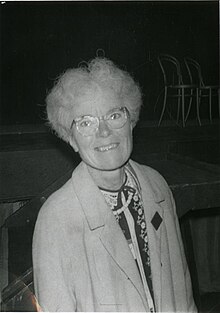Kathleen Lonsdale
| Kathleen Lonsdale | |
|---|---|

Lonsdale in 1968
|
|
| Born | Kathleen Yardley 28 January 1903 Newbridge, County Kildare, Ireland |
| Died | 1 April 1971 (aged 68) London, England |
| Fields | Crystallographer |
| Institutions |
University College London Royal Institution University of Leeds |
| Alma mater |
Bedford College for Women University College London |
| Doctoral advisor | William Henry Bragg |
| Known for | X-ray crystallography |
| Notable awards |
Davy Medal (1957) Fellow of the Royal Society |
Dame Kathleen Lonsdale, DBE FRS (née Yardley; 28 January 1903 – 1 April 1971) was a British crystallographer who proved, in 1929, that the benzene ring is flat by using X-ray diffraction methods to elucidate the structure of hexamethylbenzene. She was the first to use Fourier spectral methods while solving the structure of hexachlorobenzene in 1931. During her career she attained several firsts for female scientists, including being one of the first two women elected a Fellow of the Royal Society (FRS) in 1945 (along with Marjory Stephenson), first woman tenured professor at University College London, first woman president of the International Union of Crystallography, and first woman president of the British Association for the Advancement of Science.
She was born Kathleen Yardley at Newbridge, County Kildare, Ireland, the tenth child of Harry Yardley, the town postmaster, and Jessie Cameron. Her family moved to Seven Kings, Essex, England, when she was five years old. She studied at Woodford County High School for Girls, then transferred to Ilford County High School for Boys to study mathematics and science, because the girls' school did not offer these subjects. She earned her Bachelor of Science degree from Bedford College for Women in 1922, graduating in physics with an MSc from University College London in 1924.
...
Wikipedia
